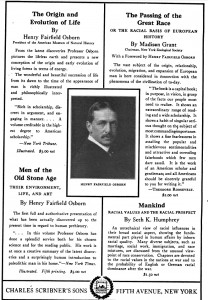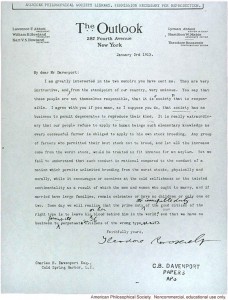Alexis Carrel, Nobel Prize Winner. Man the Unknown, 1939. [Source] There remains the unsolved problem of the immense number of defectives and criminals. They are an enormous burden for the part of the population that has remained normal. As already pointed out, gigantic sums are now required to maintain prisons and insane asylums and protect …
Category: sentimentalism
Foster Kennedy: Euthanasia for “Nature’s Mistakes” up to the age of 5
Kennedy’s address at the 97th annual meeting of the American Psychiatric Association in 1941 encapsulates well how the acceptance of evolution and utilitarian thinking are tied into arguments for eugenics (and euthanasia), which is ironic, of course, since many advocates for euthanasia deny such connections and modern proponents of evolution become apoplectic at the insinuation …
Eugenics as a Religion and Social Darwinism, Collin Wells
Source: Dr. Collin Wells, “Social Darwinism” a paper presented in 1907, found in The American Journal of Sociology, pages 706-709 Finally, what is the evolutionary value of certain ideals? Let us take individualism, the ideal of democracy, which has tacitly figured in many of the phenomena to which I have already referred. Let us go …
Objections to Compulsory Sterilization “are essentially sentimental.”
While eugenics today is castigated as ‘pseudoscience,’ the eugenicists themselves might say that the chief difference between progressives then versus now, is the latter is hindered by ‘sentimentality.’ E.A. Ross, Letter to Charles McCarthy, January 30, 1907. (As found in Rudolph J. Vecoli’s “Sterilization: A Progressive Measure” in Wisconsin Magazine of History, Spring 1960. LINK: wisconsin-sterilization-progressives-21585 …
Theodore Roosevelt on Madison Grant’s “The Passing of the Great Race”
Theodore Roosevelt commends Madison Grant’s book, The Passing of the Great Race. HT In Scribners’ magazine, 1917, Theodore Roosevelt wrote the following about Madison Grant’s book “The Passing of The Great Race”: [editor’s foreword, describing Grant’s book, followed by Roosevelt’s endorsement] The vast subject of the origin, relationship, evolution, migration, and expansion of European man …
The Duty of the State in the Treatment of the Deformed: R. Z. Mason, Appleton WI, 1879
R.Z. Mason, mayor of Appleton, WI, “The Duty of the State in its Treatment of the Deaf and Dumb, the Blind, the Idiotic, the Crippled and Deformed, and the Insane.” [Source / Italics added, bold text added] In the progress of modern civilization, the state has come slowly to a recognition of certain duties and …
Joseph Fletcher, A Right to Die; Down Syndrome people are not persons and OUGHT to be killed
[People] have no reason to feel guilty about putting a Down’s syndrome baby away, whether it’s “put away” in the sense of hidden in a sanitarium or in a more responsible lethal sense. It is sad; yes. Dreadful. But it carries no guilt. True guilt arises only from an offense against a person, and a Down’s is not a person.
Helen Keller: Physicians Juries for Defective Babies, Article in the New Republic, 1915
Due to the successful sanitization of the past in regards to eugenics, it is largely unknown how pervasive eugenics attitudes were, and how expansive eugenicists believed their program to be. Here we have Helen Keller, writing in a prominent liberal magazine, advocating explicitly for infanticide–in the name of the race. For more information and the …
George William Hunter’s “Civic Biology” — the Eugenics Textbook at the Heart of the ‘Scopes Monkey Trial’
The so-called ‘Scopes Monkey Trial’ was a media sensation at the time, but how it actually went down was shamelessly skewed afterwards to make it seem that the evolutionists were humble seekers of truth and those who stood against them ignorant, religious bigots. This viewpoint was perpetuated effectively through movies on the trial such as …
Letter by Theodore Roosevelt to Charles Davenport: Society should not permit degenerates to reproduce their kind.
From The Outlook, January 3rd letter of 1913 [Source] My dear Mr. Davenport: I am greatly interested in the two memoirs you have sent me. They are very instructive, and, from the standpoint of our country, very ominous. You say that those people are not themselves responsible, that it is “society” that is responsible. I …
- 1
- 2



Recent Comments